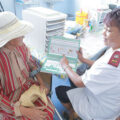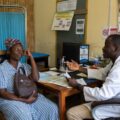
On important thing to note is that colleges and universities may combine similar specialties into one overarching concentration for example Community Health and Health Promotion or a school may use different names for their concentrations for example Industrial Hygiene instead of Occupational Health.
Biostatistics Degrees Programs and Specialization
Biostatistics uses statistical reasoning and methods to address major problems in public health. Students who concentrate in biostatistics are interested in how data, population studies, and health intersect. They study advanced statistical methodologies and apply them to better understand health trends among populations. Biostatistics students interpret results of statistical analyses from public health studies and translate the information into easily understandable facts for scientific and non scientific audiences.
Education Levels: Masters & Doctorate
Program Outcomes: Ability to design, implement, and analyze various health-related studies through the use of statistical theory, bioinformatics and biostatistical methods, planning methods, and scientific writing tactics. Common Work Environments: Academia, pharmaceutical companies, hospitals, independent research groups, public health organizations, and government agencies.
Child & Maternal Health Programs and Specialization
Experts in maternal and child health focus on the complex public health problems affecting women, children and their families. This interdisciplinary field seeks answers for the complex health considerations relating to women, pregnancy, reproduction, and infant and child well-being.
Education Levels: Masters & Doctorate
Program Outcomes: Ability to examine biological constituents of an individual’s and family’s health, along with the geographical and socioeconomic factors that may play a role in maternal and child health. Plus, design and implement health programs targeting soon-to-be mothers, mothers, infants, children, and families.
Community Health Degrees Programs and Specialization
Improving community health is a huge undertaking that involves cooperation between public health workers, local government, volunteers and average citizens alike and the end products of their work can take a lot of forms. “Communities benefit from walking trails and bike paths, from access to healthy food and playgrounds, from accessible healthcare services, schools and places of employment, as well as affordable housing.
Education Levels: Bachelors, Masters, & Doctorate
Program Outcomes: Ability to perform community assessments and develop, implement and evaluate health programs. Knowing how disease and illness can affect people.
Environmental Health Degrees Programs and Specialization
Environmental health is the branch of public health concerned with all aspects of the natural and built environment affecting human health. Environmental health is focused on the natural and built environments for the benefit of human health.
Education Levels: Bachelors, Masters, & Doctorate
Program Outcomes: Have a base understanding in toxicology, disease prevention, zoonotic diseases, occupational hazards, and air & water quality. Know how societies, occupations and geographical settings affect the health of populations.
Epidemiology Degrees Programs and Specialization
Epidemiology is the study and analysis of the distribution, patterns and determinants of health and disease conditions in defined populations. It is a cornerstone of public health, and shapes policy decisions and evidence-based practice by identifying risk factors for disease and targets for preventive healthcare.
Education Levels: Masters & Doctorate
Program Outcomes: Ability to use epidemiological and statistical methods for data analysis, research design and implementation, and transferring information to oral or written communication. Confidence to lead daily investigations and laboratory work that is relevant to individual health.
Generalist Public Health Degrees Programs and Specialization
Lays the foundation in the five core disciplines of public health – Biostatistics, Epidemiology, Environmental Health, Health Policy and Management, and Social & Behavioral Health.
Education Levels: Bachelors, Masters, & Doctorate
Program Outcomes: Ability to properly investigate, analyze, develop, and use methodologies associated with public health to help advance the studies of the field.
Global Health Degrees Programs and Specialization
Global health is the health of populations in the global context; it has been defined as “the area of study, research and practice that places a priority on improving health and achieving equity in health for all people worldwide”.
Education Levels: Bachelors, Masters, & Doctorate
Program Outcomes: The ability to properly plan, analyze, and implement public health agendas that can improve public health throughout various areas. Be able to investigate the cause of widespread illness in foreign countries, implement health policies, and promote wellness programs in areas without advanced knowledge of everyday health practices.
Health and Human Services Programs and Specialization
Improving the life and wellbeing of individuals through a combination of counseling, psychology, social work, and criminal justice skills and methodologies.
Education Levels: Bachelors, Masters, & Doctorate
Program Outcomes: Help humans through prevention and remediation to improve quality of life through the use of case management, crisis/trauma response, advocacy, conflict resolution and community collaboration. Have an understanding of project and service management, ethics, systems management, theory, and research methodology
Health Science Degrees Programs and Specialization
Health science is the discipline of applied science which deals with human and animal health. There are two parts to health science: the study, research, and knowledge of health and the application of that knowledge to improve health, cure diseases, and understanding how humans and animals function.
Education Levels: Bachelors, Masters, Doctorate
Program Outcomes: Know how to increase the efficiency in the use of technology in medical practices, research, and the development of new and innovative medical advances. Understand the underlying aspects of healthcare, such as internal hospital function, patient statistics, and theory of disease and medicine
Infectious Disease Degrees Programs and Specialization
Infectious diseases are caused by pathogenic microorganisms, such as bacteria, viruses, parasites or fungi; the diseases can be spread, directly or indirectly, from one person to another. Zoonotic diseases are infectious diseases of animals that can cause disease when transmitted to humans.
Education Levels: Masters & Doctorate Program Outcomes: Understand how diseases and illnesses are acquired, spread throughout the population, and methods for controlling them. SEE: What Does an Infectious Disease Specialist Do?
Nutrition Degrees Programs and Specialization
Public health nutrition is the application of nutrition and public health principles to design programs, systems, policies and environments that aims to improve or maintain the optimal health of populations and targeted groups.
Education Levels: Bachelors, Masters & Doctorate
Program Outcomes: skills in nutrition counseling & clinical practice, community education and health promotion
Occupational Health Programs and Specialization
Occupational safety and health, also commonly referred to as health and safety, occupational health and safety, occupational health, or occupational safety, is a multidisciplinary field concerned with the safety, health, and welfare of people at work
Education Levels: Masters & Doctorate
Program Outcomes: Ability to create and promote sustainable workplace environments, along with how to develop emergency response and disaster response plans.
Social and Behavioral Science Programs and Specialization
Behavioral Science is the study of characteristics of human. It investigates and analyze the human relationships through the behavioral aspects of disciplines such as biology, geography, law, psychiatry and political science. It explores the effect of human actions and interaction.
Education Levels:Masters & Doctorate
Program Outcomes: Ability to investigate the effects of society and behavior on the acceptance of health programs, motivation behind staying healthy, and the overall sustenance of illness and disease. Identify cultural norms or ideas that influence how people respond to health dilemmas.





